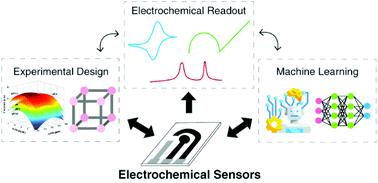Our official English website, www.x-mol.net, welcomes your
feedback! (Note: you will need to create a separate account there.)
Machine learning and chemometrics for electrochemical sensors: moving forward to the future of analytical chemistry
Analyst ( IF 3.6 ) Pub Date : 2021-09-07 , DOI: 10.1039/d1an01148k Pumidech Puthongkham 1, 2, 3 , Supacha Wirojsaengthong 1 , Akkapol Suea-Ngam 4
Analyst ( IF 3.6 ) Pub Date : 2021-09-07 , DOI: 10.1039/d1an01148k Pumidech Puthongkham 1, 2, 3 , Supacha Wirojsaengthong 1 , Akkapol Suea-Ngam 4
Affiliation

|
Electrochemical sensors and biosensors have been successfully used in a wide range of applications, but systematic optimization and nonlinear relationships have been compromised for electrode fabrication and data analysis. Machine learning and experimental designs are chemometric tools that have been proved to be useful in method development and data analysis. This minireview summarizes recent applications of machine learning and experimental designs in electroanalytical chemistry. First, experimental designs, e.g., full factorial, central composite, and Box–Behnken are discussed as systematic approaches to optimize electrode fabrication to consider the effects from individual variables and their interactions. Then, the principles of machine learning algorithms, including linear and logistic regressions, neural network, and support vector machine, are introduced. These machine learning models have been implemented to extract complex relationships between chemical structures and their electrochemical properties and to analyze complicated electrochemical data to improve calibration and analyte classification, such as in electronic tongues. Lastly, the future of machine learning and experimental designs in electrochemical sensors is outlined. These chemometric strategies will accelerate the development and enhance the performance of electrochemical devices for point-of-care diagnostics and commercialization.
中文翻译:

电化学传感器的机器学习和化学计量学:迈向分析化学的未来
电化学传感器和生物传感器已成功用于广泛的应用,但系统优化和非线性关系在电极制造和数据分析方面受到了损害。机器学习和实验设计是已被证明可用于方法开发和数据分析的化学计量工具。这篇小综述总结了机器学习和实验设计在电分析化学中的最新应用。首先,实验设计,例如、全因子、中心复合和 Box-Behnken 被讨论为优化电极制造的系统方法,以考虑单个变量及其相互作用的影响。然后,介绍了机器学习算法的原理,包括线性回归和逻辑回归、神经网络和支持向量机。这些机器学习模型已用于提取化学结构与其电化学性质之间的复杂关系,并分析复杂的电化学数据以改进校准和分析物分类,例如在电子舌中。最后,概述了电化学传感器中机器学习和实验设计的未来。
更新日期:2021-09-29
中文翻译:

电化学传感器的机器学习和化学计量学:迈向分析化学的未来
电化学传感器和生物传感器已成功用于广泛的应用,但系统优化和非线性关系在电极制造和数据分析方面受到了损害。机器学习和实验设计是已被证明可用于方法开发和数据分析的化学计量工具。这篇小综述总结了机器学习和实验设计在电分析化学中的最新应用。首先,实验设计,例如、全因子、中心复合和 Box-Behnken 被讨论为优化电极制造的系统方法,以考虑单个变量及其相互作用的影响。然后,介绍了机器学习算法的原理,包括线性回归和逻辑回归、神经网络和支持向量机。这些机器学习模型已用于提取化学结构与其电化学性质之间的复杂关系,并分析复杂的电化学数据以改进校准和分析物分类,例如在电子舌中。最后,概述了电化学传感器中机器学习和实验设计的未来。











































 京公网安备 11010802027423号
京公网安备 11010802027423号